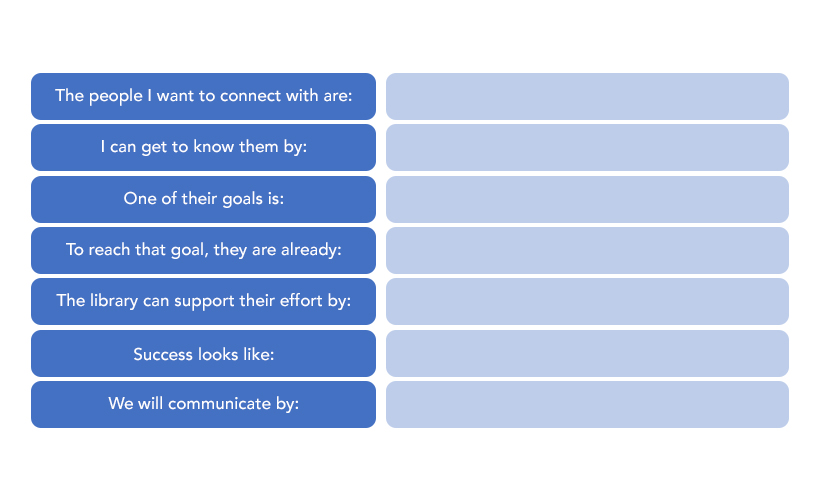Do you see yourself as a natural marketer or politician? For many librarians, the answer is a resounding “no.” That’s understandable. Most MLIS programs don’t teach graphic design or copywriting. And library marketing or politicking can sound a lot like “sales”—an idea that may feel off-putting to librarians dedicated to free and open access.
But every day, library workers at all levels are called upon to convince our communities, leaders, and funders of the value of the library. We want our communities to know about and benefit from what we have to offer. We need the political leaders in our communities and institutions to provide full funding and support. What is a non-marketing non-politician to do?
Let’s pull apart those loaded terms. At its heart, marketing is about communication. And politics is fundamentally about encouraging collective effort or decisions—that is, about participation. Facilitating communication and participation are things librarians already do well. They are at the heart of every partnership the library forges and sustains with its community.
The solution to communicating our value also lies in community partnerships. Librarians make their value and relevance clearest when they build authentic relationships that lead to meaningful shared work in pursuit of big-picture goals. Librarians should make intentional, explicit connections between their engagement work and the library’s importance to the community. Rather than simply telling people about your value, let them help you create it.
Table of Contents
Why Partnerships Work to Communicate Value
Partnerships communicate value so effectively because they actionably demonstrate the library’s role in achieving community-wide goals. A good partnership is explicitly designed to impact a shared goal that matters deeply to both the library and the partner. Often, communities and stakeholders simply do not realize that the library can play an important role in achieving a goal that is important to them. That is especially true when that goal is not directly tied to literacy. When you form a partnership, you provide concrete, detailed proof of the unique ways that the library can work alongside other agencies to help the community achieve its aspirations.  Partnerships communicate value on an emotional as well as intellectual level. People become invested in the things we help create. When a community group or leader has made a real impact through collaborating with the library, they feel a sense of pride and ownership that cannot be easily built in other ways. This feeling stays with them, informing their decisions at the ballot box or the budget meeting.
Partnerships communicate value on an emotional as well as intellectual level. People become invested in the things we help create. When a community group or leader has made a real impact through collaborating with the library, they feel a sense of pride and ownership that cannot be easily built in other ways. This feeling stays with them, informing their decisions at the ballot box or the budget meeting.
How to Create Authentic and Meaningful Partnerships
To communicate value in a highly impactful and lasting way, partnerships need to be true collaborations. The partner should hold as much or more power than the library to determine goals, define success, and plan actions. (On the IAP2 Spectrum of Public Participation, these are relationships in the “collaborate” or “empower” far right-hand side of the spectrum.) This approach is inherently strengths-based and rooted in asset-based community development. Below are a few key steps to building this kind of deep partnership.
Invest in building real relationships.
Relationships are the foundation of partnerships. Real relationships are not transactional or extractive. Building them means getting to know a community, showing up, listening, and developing mutual understanding and trust—all with no idea if a project partnership will emerge at all. This takes a significant investment of staff time with no guaranteed product. It requires staff to be afforded significant flexibility and autonomy. It is also the most essential step in creating impactful, sustainable partnerships that transform people’s perceptions of the library’s value.
Begin your planning at the end, by defining in concrete terms what you want to achieve together. As noted earlier, one of the primary ways that partnerships communicate the library’s value is by demonstrating its role in reaching community goals. Take this opportunity to make clear exactly what goal you are supporting and how.
Make plans.
Assumptions are the enemy of partnerships. Determine together what key milestones you will reach together, by when, and who is responsible for each step. Ideally, put this in writing to confirm shared understanding. It is perfectly fine and normal for plans to change throughout the project. The purpose of a plan is not to set everything in stone, but to prevent misunderstandings or mismatched expectations that could impair the partnership later.
Include a communication plan.
This speaks to cultural humility, especially when partnering with communities or individuals who have different lived experiences from library staff. The “library” way of communicating is steeped in a paradigm that is not universal. Other communities will have different and equally valid expectations about how and when communication should happen. Misaligned assumptions about communication are serious; they can lead to feelings of resentment and relationship damage. Discuss how you both prefer to communicate, and, whenever possible, defer to your partner’s wishes.
Define success together—and accept that it might look different.
For the partner to see the library’s value, they need to know if and how your shared work made a difference. At the end, you should be able to show that what you did helped achieve the big-picture goal you set together. The normal statistics you collect—attendance numbers, satisfaction ratings on written surveys—might not tell a meaningful story for your partner. Discuss together: What does success look like to them? What would make them feel that success had been achieved? Then determine what and how to evaluate.
Three Tips for Successful Partnerships
- Language matters. When you are trying to communicate value to a partner, adopt their language. Listen to how they talk about their goals and the things that matter to them. Then use those words when describing what you do. This helps to clarify what goals you have in common and shows that the library has a real role to play in the topic the partner cares about.
- Tell the story. Do not assume that your partner will automatically draw the connection between the goals they care about and the actions you took. At the end of a project, take time to communicate the whole story back to them. Restate the big goal or idea you shared, how the initiative was intended to help, the roles you both played, and where you succeeded together. This story cements their understanding of the library’s importance to their own goals.
- The relationship is more important than the partnership. The mutual trust and respect you share matters much, much more than any one specific project. Some partnerships do not work. That’s normal and healthy. If an unworkable collaboration is straining the relationship, let the project go. If the relationship is healthy, there may be other opportunities to collaborate. If the relationship fails, no project can succeed.
Put It All Together
To communicate your value, don’t worry excessively about your skill in one-way communications like making flyers or giving presentations. Instead, engage people in co-creating the library’s value by collaborating to achieve shared goals. The brainstorming questions below can help you identify potential partners, build relationships from an asset-based perspective, and think through meaningful ways for the library to support community goals. As librarians, we know that libraries can be transformative partners in achieving almost any community aspiration. When you engage and invite your community to be part of that transformation, they will know it, too.
Brainstorming questions: 
See also:




